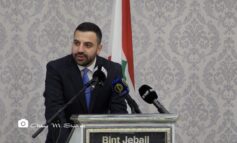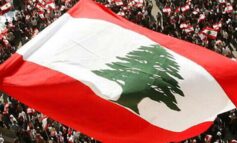I had the opportunity to spend the last six weeks in Lebanon, making pleasure and working visits to different areas of the country and engaging in political and other discussions with local officials, academics and opposition activists. The experience has been instructive, simultaneously heartening and depressing, but has also suggested to me obvious opportunities as well as dangers in the struggle to resolve the current conflict and form a national unity government. The obvious overarching feeling throughout Lebanon is dismay with the ongoing unresolved conflict that is preventing the country and its people from a normal life and is not the way “politics” should be conducted.

|
| Lebanese army tank makes its way to South Lebanon |
Everywhere I went I heard people talk about their love for Lebanon. But it looks like they are putting into action the saying that, if translated, would read: “too much love can kill.” This, in my view is what all of them are doing to the country and its people: Killing it. What is sadder is that these same people who are suffering from the actions of all the so-called “politicians” are still following them blindly. The most famous proverb in Lebanon is “the son of a “zaiim,” is zaiim.” Thus, people find a zaiim and follow him blindly. And that zaiim is a “completely, utterly and supremely nationalistic leader” who has the “highest patriotic feelings” for Lebanon and puts all his time into caring for the “Lebanese national interest.”
Worse yet, people don’t think on their own. They just nod their heads at everything the zaiim says, and hate everyone he hates. Most importantly, they say that at least they know there is someone out there who is going to “protect me” from all the different forms of “infidels.”
Every day I heard people defend their own “party” stance on current issues. They attribute different opinions to different sects. They discuss sports in terms of sects. They watch TV, and think of it as a sect. They speak of the times of 1917, 1943, 1948, 1958, 1967, 1975, 1990, 2000, 2005 … but they fail to understand and learn from them. They talk about change, but are afraid of letting the “other sect” have more power. They want a democracy, but they want “their sect” to be on top. They want justice, but won’t accept it when it incriminates one of their own. They breathe in and are intoxicated by these “sects” and then go on and blame their politicians, when in fact the politicians are just playing to the audience. Let’s face it, the leadership mirrors the masses. The fetus of Lebanon’s government in the aftermath of Syrian control has stopped developing. The essence of dialogue has lost itself in the do’s and don’t of sects.
Moreover, there is an extreme flurry of ideologies that have blinded the Lebanese people and their politicians to the details: Arabism, anti-Arabism, communism, socialism, fascism, religion, freedom and democracy, “We want the truth” aka “al haqeeqa” (a concept that has taken Lebanon by storm since 2005), sectarianism and Phoenicianism have become the opium of the masses. The latest examples in Lebanon were created after Hariri’s assassination — in which calls for freedom, democracy, and the truth have been vocalized. We most definitely do want all three, because we believe that it will give us a better life; but in the name of freedom, democracy, and the truth, Lebanon has ground to a standstill. And now, in light of recent events, we have the new and slightly less enunciated ideology of “the presidency.” Call it necessary. But it displaces our concentration from the more important details of making our country, and on a more basic level, our lives, work. The “presidency” is being recast into sectarian angles for political gain, from all sides.
The latest Lebanese by-elections exposed a need for leaders to take action. I was appalled by the comments of several Lebanese leaders concerning the way Armenians voted. I consider the Armenian community in Lebanon an integral part of the Lebanese society and their rich culture is a great contribution to Lebanon that all Lebanese should be proud of. As to why the majority of Armenians voted the way they did, well, that is called democracy. They do not have to justify the way they voted to anyone. If former President Amin Gemayel wanted them to vote for him, then he should have given them a good reason to do so, instead of using his son’s death as a political card to get elected.
The present formula has definitely failed. We need a think tank team to develop systems and procedures, to effect a real turnaround. The status quo only reflects old ideas and basically retreats to the feudal system which has presented us with so many problems. The focus on percentages of races, religions or creeds within the Lebanese population is part of the problem. A society should look to a rule of law based on objectivity and impartiality. It is not a question of trusting the opinion; it is that the opinion on this matter should be irrelevant.
There is no way out for Lebanon until it becomes 100 percent secular with all religions out of the public sphere. This will only happen when the Lebanese army is mobilized. In Turkey the army has been the protector of the republic since Ataturk came to power in 1924. The Turkish army has interfered in Turkish politics three times since then. Each time when the country was going nowhere with political instability and clashes, the army took over, dissolved the Parliament, and forced the ministers to resign. When matters calmed down they called for general elections and withdrew.
Thus it’s time for the army to take over the reins until the bickering politicians calm down and learn their lessons. After they calm down the army will call for general elections and withdraw. I have full faith in our army and if there is a time for them to interfere it is now. The army can lead the way to normal statehood, a decent and accountable government, and reasonably equal opportunities for all its citizens.
The writer is professor of interdisciplinary studies at the University of Toledo in Ohio.





Leave a Reply